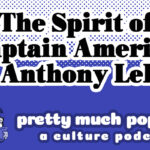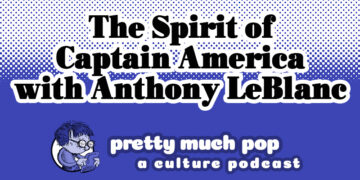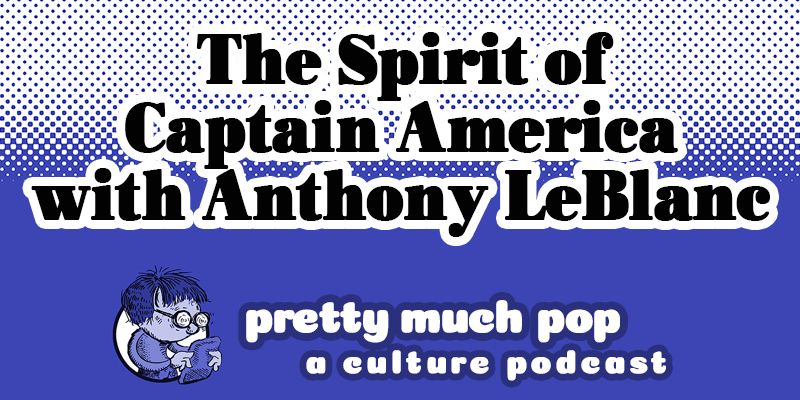


What is it for a super-hero to represent America? Though the character created by Joe Simon and Jack Kirby in 1941 may have been a way to capitalize on WWII patriotism, it has since been used to ask questions about what it really means to be patriotic and how America’s ideals and its reality may conflict. We’re of course talking about race, a theme explored by Sam Wilson, formerly Cap’s side-kick, picking up the shield in the comics and now on TV (and in the forthcoming film).
Your Pretty Much Pop hosts Mark Linsenmayer, Erica, and Brian are joined by comic super-fan Anthony LeBlanc (returning from our ep. 56 on black nerds) to discuss the recent comic runs by Ta-Nehishi Coates and Nick Spencer and especially Truth: Red, White and Black, Marvel’s 2003 comics mini-series by Robert Morales and Kyle Baker that tells the story of American super-soldier experiments on unknowing black men (reminiscent of the real-life Tuskegee Syphilis Study). This was the source of the “first black Captain America” character Isaiah Bradley featured in The Falcon and the Winter Soldier Disney+ show, which we also discuss.
Here are a few articles that fed into our discussion:
- “The Power of a Skeptical Captain America” by Sophie Gilbert
- “‘The Falcon and the Winter Soldier’ Never Took Its Protagonist Seriously” by Justin Charity
- “‘The Falcon and the Winter Soldier’ Was Riddled With Contradictions” by Alison Herman
- “When Sam Wilson Became Captain America” by Brittany Matter
- “Why I’m Writing Captain America, and Why It Scares the Hell out of Me” by Ta-Nehishi Coates
- “My Secret History With Secret Empire: Looking Back At Nick Spencer’s Captain America” by Vishal Gullapalli
- “Secret Empire Creators Preview Captain America’s Assault on the Marvel Universe” by Christian Holub
- “Captain America Goes to War With Jordan Peterson” by Matthew Gault
- “Black Panther Writer Criticizes Marvel’s Treatment of Comic Creators” by Robert Wood
The final issue of Ta-Nehisi Coates’ Captain America is coming July 7.
We recommend the Captain America Comic Book Fans podcast for more information. Their recent interview with longtime editor Tom Brevoort was illuminating, and they spent eps. 33 and 34 walking through Truth: Red, White & Black.
Hear more of this podcast at prettymuchpop.com. This episode includes bonus discussion that you can access by supporting the podcast at patreon.com/prettymuchpop. This podcast is part of the Partially Examined Life podcast network.
Pretty Much Pop: A Culture Podcast is the first podcast curated by Open Culture. Browse all Pretty Much Pop posts.
Storytelling and Race in Captain America — Pretty Much Pop: A Culture Podcast #98 is a post from: Open Culture. Follow us on Facebook and Twitter, or get our Daily Email. And don't miss our big collections of Free Online Courses, Free Online Movies, Free eBooks, Free Audio Books, Free Foreign Language Lessons, and MOOCs.
from Open Culture https://ift.tt/3jOjpEO
via Ilumina
Comments
Post a Comment